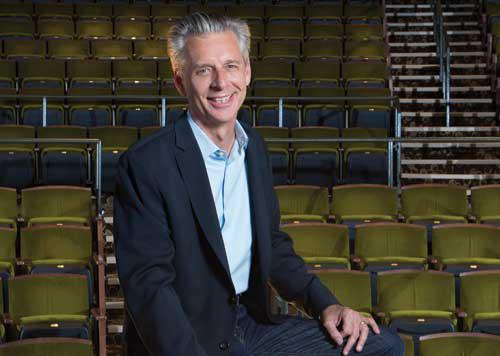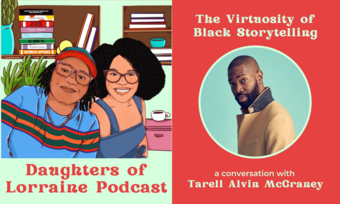Interview with Michael Ritchie
Theresa Rebeck: Can you narrate for me how you program each season? You program three different theaters, right?
Michael Ritchie: Three theaters and probably anywhere from fifteen to twenty-two, twenty-three productions, maybe even more.
Theresa: Wow.
Michael: Yeah.
Theresa: Is that fun?
Michael: Yeah, it is, once you get into it. The first year there was definitely a level of insanity. I had no idea what I was doing but once you catch the rhythm it makes more sense. I had to change one of the seasons—all three theaters were running September to August—I had to take the Taper and put it on a calendar year, January to December because I couldn’t plan three theaters at once. My head was exploding.
Theresa: So let’s start with the easy one like the Ahmanson, you program that mostly with shows that are going to Broadway or touring. What else goes in the Ahmanson?
Michael: For the most part the Ahmanson is a touring house and that is the way we want to utilize it. So any big shows, particularly musicals coming from Broadway and touring, will play there. We look at pre-Broadway shows as well, where we start musicals out of town. And sometimes we do self-produced shows. I opened my tenure producing Dead End. We’ve also done Black Rider, the Tom Waits/Robert Wilson piece. We’re doing 33 Variations. We’re doing our own production, but it’s essentially a remounting of the Broadway production, and we produced our own production of History Boys.
Theresa: You would never produce a brand new play there, right?
Michael: I would have to be very surprised by a play that had so much value that I could put it into a sixteen hundred-seat house. It would have to come with something—who was writing it or who was performing it that put it at such a level that you knew it could live within that space. But we do new musicals in there obviously.
Theresa: Right. And do you develop musicals at the Taper? People come to you and say I have this idea and you think oh, that’s a good idea; I will help them develop that.
Michael: Curtains, The Drowsy Chaperone, Leap of Faith—all of them started here. People bring us projects and I think, “I want to work on that.”
Theresa: And how does the audience piece of it fit into it for you?
Michael: It’s a mix. Certainly we want an interested audience for all of our shows but if the audience were all we cared about we’d be commercial producers; there’d be no need for institutional theater. I think institutional theater exists to develop both the artist and the audience and not independently. There are choices we’ll make about doing shows where we have a concern going into the show about whether there’s a large enough audience to support the work in every way: support it financially, support the artist by having people see it, and support the institution in being able to produce this kind of work and move it forward.
One of the great problems with the subscription model—the institutional model that exists right now—is that because you are generally producing for a specific audience you can begin producing just for those people. Sometimes your taste gets sublimated by their taste. They’ve gotten their taste by coming to see things you’re doing and choosing, so it's this tightening spiral of lesser ambitions when you feed that beast.
Theresa: It sounds to me like what you are trying to do is believe in your taste and believe that the audience will respond to it.
Michael: Yes and in some cases what you do is actually push the audience away. You have to do that strategically—you push a segment of your audience away to expand your audience. A good example of that is when we did Black Rider—Robert Wilson, Tom Waits, avant-garde to the hilt. I put it into my first subscription season at the Ahmanson, where the audience is largely made up of people who were fed on My Fair Lady and Les Miz—musical people. So we put this avant-garde piece into the season. When the show started, I could stand in the back of the house, and watch them get up and leave by the dozens. They’d leave in groups of two. They’d leave in groups of six. They’d leave noisily. It was not their idea of theater. And over the course of an act you would lose a hundred or a hundred plus people, basically storming out of a show. At intermission, half of the rest of the subscribers would flee. They at least had the courtesy to wait until intermission. But what happened was we had single ticket buyers, a younger audience that we were desperate to attract to our theater, sitting in the balcony, sitting in the mezzanine, who of course loved the show, and in the second act, came down into the orchestra and filled in the seats of all the people they watched leave during the first act.
And ultimately, I had board members say to me that Black Rider was a huge failure. My argument back was no it wasn’t! We lost subscribers for that show, but we didn’t lose them as subscribers. They remained subscribers the next year and they renewed. And we brought in a completely new audience who had never come to us before because they never wanted to see My Fair Lady. The subscription audience learned their limits, and so did I, but I also learned that I could push the limits of their taste. It was my first season and of the twenty-two shows I produced, Black Rider was second highest grossing show, and it attracted more single ticket buyers and a younger demographic than we had ever had in our theater. So for me it was a huge success. You don’t necessarily have to feed the beast what it wants. Sometimes you force it to eat what it doesn’t want to everyone’s benefit.
Theresa: So you produce in response to a lot of different concerns.
Michael: Exactly. I got very frustrated about three or four years ago when we commissioned Dael Orlandersmith for a play. And Dael came in and said, “what do you want me to write about” and I said, “I don’t give a shit what you want to write about, you’re not writing to fit something, just write the play that you want to write.” And she went off and she wrote this play. And it was this really complicated piece about a mother and her two grown children meeting together in an airport hotel room and basically rehashing past events in their lives, including serious accusations of incest from the father who had disappeared and the mother as well. It was almost like a tone poem about incest, and Gordon Edelstein who was directing it wanted to add a live jazz underscoring to the piece. And it was really dark and really hard and we did a reading of it and it’s like wow, there’s really something here. She did exactly what I said she could do and what she wanted to do and yet I can’t produce it. Because if I put this in front of a subscription audience, they won’t like it, and I won’t know how to sell the tickets to it. So we came up with a new model of producing at the Douglas. We had been doing six subscription shows a season, and I said we’re only going to do three. The other six months we’ll do opportunistic programming and produce to suit the play.

One of the great problems with the subscription model—the institutional model that exists right now—is that because you are generally producing for a specific audience you can begin producing just for those people. Sometimes your taste gets sublimated by their taste.
For Bones, which was the name of Dael’s play, we closed off the stage from the audience and we built a new theater on the stage. We basically went from a three hundred-seat theater to a hundred and twenty-seat theater and instead of having a six-week run we programmed a three-week run with six performances each week. We calculated what the audience would be for this show and then we produced a full-scale production. We had a full rehearsal of it and a full house. The critics came and loved the show. It was well received because it was in the environment it belonged in and Dale felt that we had done everything that we had promised. She would never have gotten this play produced anywhere else because there was not a model to produce it in an institution this large. She might have been able to get it done Off Off Broadway in a fifty seat theater but to have a first class producing organization get behind her and this play was significant. So we’re changing how we produce. Douglas Plus, as we call it right now, is really a test model for how we are going to be producing in five or ten years.
Theresa: Wow, you are a hero.
Michael: I wish I could take all the credit for it but here’s what you have to realize. We were sitting around in a staff meeting and it wasn’t me saying we’ve got to come up with Douglas Plus. It came up from me, pounding my fists on the desk saying fuck subscribers. I’m so tired of subscribers. They drive me nuts; they’re strangling me; I hate them. I don’t care how good they are; I don’t care how much money they bring in. Fuck subscribers! And someone there at the table said well if we’re going to fuck them we should tell them we love them first, and we should figure out a way that we can fuck them but they stay anyway. How could we have it all?
I mean you’ve been through development hell. It is a nightmare to watch a playwright have to audition their piece over and over. There should be a path that says you can commission. You can develop. You can say yes or no. But the intent should be to produce. The belief should be that you have every possibility of being produced as opposed to being in a development mill, a factory that is just churning out stuff. It’s like the end of Citizen Kane when they go through the warehouse. I think of all the plays that have been commissioned and bought that have never seen the light of day. The playwright earned some money but is that good enough?
Theresa: Why do you think that model has grown like kudzu all over the country? Certainly it is something that playwrights don’t find satisfying and I can’t imagine that theaters find it satisfying.
Michael: My guess is it followed the money. I wasn’t around back when that conversation started but I’m sure someone had a bright idea for creating more new plays and thought, “well, why don’t we get funding to commission them?’ And then another theater came along and started commissioning and then foundations started giving money to it and individuals started supporting it and suddenly everyone had a new play development commissioning program within their building. Then came readings and workshops and suddenly it was systematic. The first theater I ran was Williamstown. It had no resources and no time for development. We had a second stage but it was a producing stage so essentially our development process was in producing. In the ten years I was there we probably had twenty of those plays move on to other institutional theaters or Off Broadway runs. I thought that’s the way to develop a play—produce it. You develop it by producing it; you don’t develop it for the sake of developing it. You don’t develop it for a bumper sticker pasted to your organization that says, “we care about new plays.” The purpose should be about producing.
Theresa: Right, okay, then why are so many producers uncomfortable with new plays? You’re clearly not. When did it become a “risk” to do a new play?
Michael: I don’t know. I think it’s all about risk.
Theresa: But why is it a risk? Is it a risk?
Michael: I don’t know! I don’t see it as a huge risk. Well again, I am in an institution whose entire history is about new plays. It’s part of the organization’s soul so our staff and board support it and our audience understands it automatically. We’re kind of alone in a pretty large field in LA so I’m not necessarily the best one to answer that question. With Williamstown and here I’ve been given two of the best places in the country to produce new plays. The risk is less for me than it may be for others so it may allow me to be riskier or I may be allowed to spread my risk more evenly because I’ve got better resources to support that. I don’t find it risky, you know.
Theresa: I live in New York and I’ve been a Tony voter for a bunch of years. Which sounded like fun but it turned out maybe not to have been such a great idea, because I have to see everything and over time I didn’t want to see any more revivals. And I can’t help but wonder if the audience is feeling the same thing.
Michael: People love new movies. They love new books. They love new restaurants. They love new. It’s got to be good. They’ve got to understand what that journey is but once they’ve been on the journey, what’s wrong with new? There’s a smaller subset of the populace that goes to the theater than goes to the movies but people don’t go to old movies. They go to new movies. In The New York Times Review of Books, they’re reviewing books that were published in the past week not thirty years ago. And you can go back and read The Great Gatsby if you’re a big reader but you’re also going to pick up the new Jonathan Franzen novel. Theater should have that same range as well.
Theresa: But do you have enough variety at the Taper in terms of the ways you can produce shows that you can create a balance?
Michael: Yeah, at the Taper I would say it’s a pretty even mix that includes completely new plays, and I don’t care if it’s a world premiere, an American premiere, or a West Coast premiere. That’s meaningless. A new play is a new play. It could be the third production and it’s still considered a new play. Although I l do love the journey of being the original producer of the play. There is great fun in the process of getting to the opening night; that’s not about ownership or fingerprints on it. I like the vibrancy of what happens on a new play. But at the Taper we completely mix it up. Throw the ball up in the air and see what lands at any given moment. We’re coming off doing this new Randy Newman musical, we had done Lieutenant of Inishmore and before that we did Glass Menagerie. We’ve got 33 Variations and The Novelist coming. We have that range in a season from classic old play to a completely new play to a revival of a recent new play or a second or third production of a completely new play. I think it works very well. It’s a good model for producing for everybody including the audience.
Theresa: When you started varying things like this did your audience grow or has it stayed steady?
Michael: Its essentially stayed steady. It grows on individual shows for different reasons. Some you can calculate, some you can’t. Since we started doing surveys, we know a younger and newer audience is going through our doors.
Theresa: And do you vary your ticket prices?
Michael: Yup. It's across the board. We have subscription packages; we have early buys; we have twenty dollar tickets at every single show; we have medium priced tickets that we change on different nights; we do dynamic pricing like the airlines where demand will change.
Theresa: Oh, that’s cool. I’ve always wondered why people didn’t do that. If you have a hot show with Captain Kirk in it charge an extra ten bucks.
Michael: It’s tricky to pull off though—to suddenly start raising the price when you’re selling out. But we’re doing that now. The other thing that kills me about the subscription model is that you end up running your bombs and closing your hits because a year and a half in advance you’ve decided how long the run is going to be. So you’ve got a shitty show and it’s going to run for eight weeks when you can close it in four and you’ve got a huge hit that could run fourteen weeks but you’re closing it in eight.
Theresa: That’s crazy.
Michael: It kills me.
Theresa: So there’s still no solution to that yet?
Michael: What’s hard is that there is a solution to it, and this is what Lincoln Center does with their membership program. They don’t plan a season. They go from show to show and depending upon demand will run it or close it. Going from a subscription model to a membership model is difficult to do in a seamless way. That’s one of the things we’re trying to do with Douglas Plus—push our subscribers into a membership model so that we can do it at the other theaters too.
Theresa: Okay, this is another question about ticket prices because in New York everyone is always griping about it with good reason. I keep thinking, you have to bring the tickets down. They famously lowered the ticket prices at the National and they sell out all the time now. Is that model just impossible in America?
Michael: That I don’t know. I know it was a big deal when the National went to the ten-pound ticket. It was completely underwritten by Travelex so finding a sponsor to do it was part of it. All that government underwriting of the arts skews the equation too.
When I arrived we had nineteen different discount ticket programs—senior citizens, pay what you can, rush tickets, student tickets. There were nineteen different ways that you could get a discounted ticket and most of them had restrictions—bad seats, you couldn’t return them, you couldn’t exchange them. When I came in I said, we’re going to put in twenty-dollar tickets, that’s it. That’s the only discount program. Twenty dollars is reasonable; it’s twice the price of a movie. They have to be reasonably good seats. They have to be available online and you have to be able to exchange them. They’re just lower priced tickets. We immediately started selling more tickets because of that.
The fear was that the people buying eighty dollar tickets would start buying twenty-dollar tickets, but that didn’t happen. The people who are buying eighty-dollar tickets are happy buying eighty-dollar tickets. So you’re not cannibalizing your existing audience—you’re bringing in a newer audience and it’s generally younger.
Theresa: It’s nice to talk to you and hear about all this creative problem solving. It’s unusual. You make producing theater sound cheerful and not dire.
Michael: We’re going through the same financial struggles that everyone is going through but I like them. When I was up at Williamstown, I said in a staff meeting once— because something was going wrong—there’s nothing I love better than a disaster. They printed up these business cards, thousands of them, that say, “there’s nothing I love better than a disaster” and gave them to me and I use them as note cards. If there weren’t problems, no one would pay me.
Theresa: Well, I don’t have any more questions. Do you have anything you want to add?
Michael: I have to tell you this. I started in the theater doing musical summer stock. I didn’t even know new plays existed and then when I moved to New York and started stage managing it was at Circle in the Square which was devoted to revivals. So it wasn’t until I was in my thirties that I started working on new plays, first as a stage manager and then producing them, and let’s face it, that’s where the fun is. That’s where the risk is, but that’s also where the greatest reward is. And the reward doesn’t have to be a Pulitzer Prize, or the critics love it, or you get patted on the back. The reward is in doing it and that’s the fun.













Comments
The article is just the start of the conversation—we want to know what you think about this subject, too! HowlRound is a space for knowledge-sharing, and we welcome spirited, thoughtful, and on-topic dialogue. Find our full comments policy here
Thank you, Michael, for reminding us of the joy of problem solving. Buckminster Fuller used to say that humans are "local problem-solving units", that we are all HERE for problem solving and the better we get at them the more we get to solve. Glad you have so many interesting problems on your list. I'm betting you guys will solve a slew of 'em!
I'm in favor of the 20 buck tix, exchangeable to every show and dynamic pricing. I also think it makes sense to reward optimists with ticket pricing, so that they do get a deal for committing early, which is also what happens with airlines, even if the ticket price ebbs and flows later.